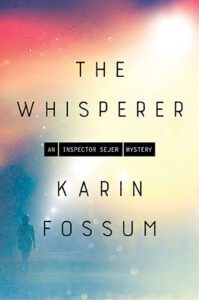Home »

An insightful urging of compassion
Book Review
By Derryll White
Fossum, Karin (2016). The Whisperer.
“You must always be the master of your own life.” – Karin Fossum
 In the very beginning of this novel Inspector Sejer acknowledges that he still gets excited by hearing stories. It is a simple foreshadowing of Karin Fossum’s own outstanding gift of storytelling.
In the very beginning of this novel Inspector Sejer acknowledges that he still gets excited by hearing stories. It is a simple foreshadowing of Karin Fossum’s own outstanding gift of storytelling.
The author is noted as an exceptional writer of Nordic noir, and ‘The Whisperer’ may be her darkest book yet. She bridges the gaps we still choose to leave open in our social comprehension – the realities of mental illness. The reader continually wonders what is going on in Ragna Riegel’s mind. Her life is so joyless and flat, sparked only by the internal fantasies she creates. As she states to a taxi driver, “I’ve always been on a shelf.”
Ragna’s father loved her, gave her great gifts of thoughtful stories, and was wracked with mental disability. He got lost regularly and played in traffic, finally committing suicide. Ragna grew up loving her parents, and alone. Her illegitimate son was her life, but he needed to be free of the family dissonance and left home early for Berlin.
Fossum creates a compelling flawed character who explores aloneness, loneliness and a world that she is very distant from. In the end writing helps Ragna to break through her aloneness and communicate with her distant son. The act is a celebration of the power of writing.
The reader may see some aspects of self in Ragna Riegel. Her synergy with Inspector Sejer helps the reader explore just what links one needs in order to be satisfied with one’s personal account of life, and death. It would be a disservice to the reader to explore the plot here as one really needs to enter Ragna’s world and find one’s own way to definition and reason.
We must always think of justice when we judge – not just attach labels or put others in pretty boxes. Karin Fossum urges us to have compassion. She is an amazing, insightful writer.
********
Excerpts from the book:
 MEMORY – “Memory is a funny thing. Why do we remember all the small things, and forget so many of the important things? Is it the same for you?
MEMORY – “Memory is a funny thing. Why do we remember all the small things, and forget so many of the important things? Is it the same for you?
“Possibly,” Sejer replied. “But our problem is not that we forget, but that we remember only too well. Our brains don’t always manage to select the best things.”
MATURITY – He was getting older. He did not have many years left in the high-backed chair from Kinnarps that he had bought himself. He wanted to have a sense of self-respect when he retired, to know that he had given everyone the opportunity to explain themselves in detail, that he had given them time, that he had listened with an openness, understanding and respect.
LIFE – It’s inside the four walls of the home it happens, he thought, the abuse and betrayal, threats and slavery. It often went on for years, and no one knew anything about it. The same defence mechanisms in people that made them avoid anything uncomfortable, also kept them alive. It was a paradox that had always bothered him.
FOREGIVENESS – If he was honest, he had never really understood what forgiveness was himself. What it entailed, what it might mean to those implicated. Could one forgive and then later regret it, like giving a present one couldn’t really afford? He suspected that the one who forgave had a motive for doing so, in much the same way that the guilty part had a motive for the crime. Was forgiveness something that the victim or those affected gave out of pure magnanimity, a generosity of almost divine proportions, or was there an egotistical need to be better than the offender? See this insurmountable divide between us? Well, I’ll just make it bigger. You’ll never reach my level, that is your punishment, you will never deserve it. You will have to carry my forgiveness for the rest of your life, and it will be as heavy a burden as the crime you have committed. It is binding and it will hold you forever. If you break this pact we have made, through my forgiveness, you will be eternally damned.
 – Derryll White once wrote books but now chooses to read and write about them. When not reading he writes history for the web at www.basininstitute.org.
– Derryll White once wrote books but now chooses to read and write about them. When not reading he writes history for the web at www.basininstitute.org.







